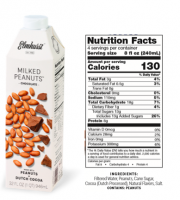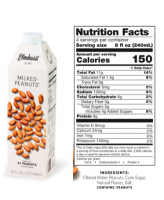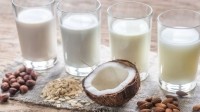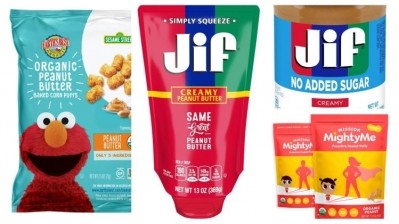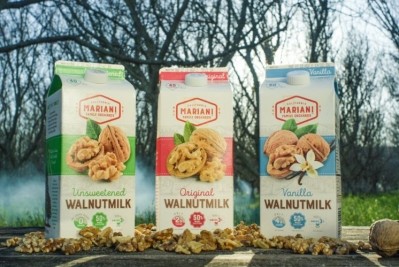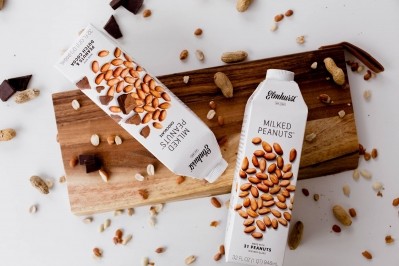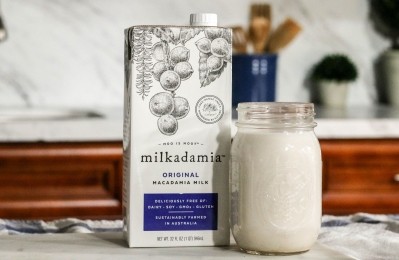Can peanut milk be as big as almond milk? Elmhurst ‘milked peanuts’ to hit stores in early 2018 with no gums or stabilizers
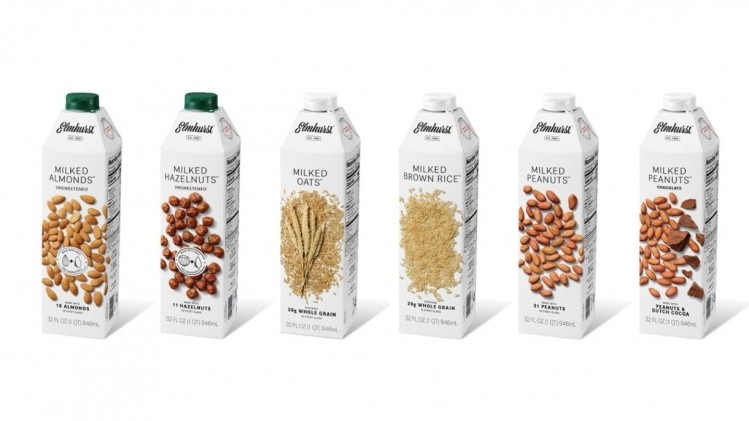
Manufactured by Steuben Foods in Elma, New York, via a patented, proprietary ‘cold milling’ process that begins with whole nuts, the lightly tan-colored original version of the peanut milk has a creamy mouthfeel but refreshing consistency created without emulsifiers, gums or stabilizers (which are typically used to hold plant-based proteins in suspension and to create a thicker mouthfeel).
It contains just five ingredients - filtered water, peanuts, cane sugar, natural flavors, and salt - and has 150 calories per 8oz serving (which is at the higher end of the spectrum; an 8oz glass of whole milk has 136), but has four times the nuts [31 peanuts in every glass], six times the protein (6g), and less sugar (5g) than best-selling almond milk brands Silk and Almond Breeze, which both have 1g protein, 7g sugar, and 60 calories per 8oz glass.
It contains a small amount of calcium from the peanuts, but is not fortified with added vitamins and minerals.
The chocolate version (featuring Dutched cocoa) contains slightly more protein and sugar (8g protein, 13g sugar/8oz glass). However, it has fewer calories (130) as it has far less fat (3g vs 11g for the original variety) as Elmhurst uses more raw peanuts to increase the protein and skims the fat during the filtering process.
No gums, stabilizers, emulsifiers
The milks can be used in coffee and tea but will “feather or marble a bit, which is natural… it’s actually a good test to see if the product contains gums, stabilizers, or emulsifiers,” Elmhurst Milked product manager Kimberly Behzadi told FoodNavigator-USA.
“Retailers we pitched this to at Expo East [the SRP for the 32oz multi-serve product, utilising combidome packaging, is likely to be in the $4.99-$5.99 range consistent with the other lines in the Elmhurst Milked range] were very excited about the product because it’s bringing something new to the category. We can’t name names at this stage but hope to have more announcements later in the year as there has been a healthy amount of interest in the product.”
When it comes to additional product development beyond milks, she said: “The sky is the limit. We already have a bunch of products in development for next year."
Elmhurst Milked product manager Kimberly Behzadi would not go into detail, but told FoodNavigator-USA that the “proprietary cold milling process [the nuts are not heated up as they are ground with water] separates the almonds into their essential components: oils, protein, fats and fiber…
“Similar to a French press, the ground almonds are then pressed with a very fine screen that traps fibers and stray bits of the nut, leaving the nutmilk ready to be bottled in an aseptic process.”
The products have a six-month refrigerated shelf-life but once opened, should be consumed in 7-10 days.
Peanut milk has a natural place in this market
While there have been many new entrants to the dairy alternatives space in recent years, this is one of the most eagerly anticipated, given the mass market appeal of peanuts vs some of the more niche offerings in this space, said National Peanut Board president and CEO Bob Parker.
“Whether it will rival almond milk I can’t say, but I think peanut milk has the potential to be a huge category; it has a natural place in this market and it’s been a gap in our product portfolio forever. It’s been one of my major goals to try and find a company to bring a [peanut milk] product to market, so I’m really excited that Elmhurst is partnering with us on this. So many times when I have been traveling, people have asked me, why isn’t there a peanut milk on the market, and I have always said, 'We’re working on it!'
“It goes back to our relationship with Dr Cheryl Mitchell [a food scientist specializing in developing ‘milks’ from grains, nuts, seeds and legumes using mechanical and fermentation methods], who we commissioned to develop a peanut milk product, and she introduced us to Henry Schwartz [CEO of Elmhurst, a dairy company which closed its unprofitable fluid milk operation last year and pivoted 180 degrees towards plant-based milks].
“I flew up to New York to meet him and we started talking and they [Elmhurst] purchased the technology from Dr Mitchell and hired her.”

Interested in plant-based dairy alternatives? Checkout the speaker line-up at FOOD VISION USA Nov 13-15...
Significant growth potential
He added: “To increase peanut consumption in a mature market will require new usage occasions or new products, and this is a product that has the potential to drive significant growth. What’s also exciting is that there is so much potential to create other peanut-based products from yogurts and ice creams to creamers.”
He added: “I think consumers are going to love the taste and the clean label. I think we’re going to attract consumers of plant-based milks but also dairy drinkers that want something with more protein in it.
"But sustainability is also very important to the consumer, and when you look at water use, fertilizer use, and so on, peanuts are very attractive.
“Unesco data [from 2010] shows that it takes fewer than five gallons of water to make an ounce of peanuts compared with 80 gallons to produce an ounce of almonds [although the Almond Board of California notes that water efficiency has improved considerably in recent years].”
According to Nielsen data collected by the Plant Based Foods Association for the 52 weeks to August 12, 2017, US retail sales of milk alternatives were up 3.1% to $1.5bn (within which sales of soymilk are declining but other plant-based options are growing strongly).
The actual market size is likely to be larger as the Nielsen all-outlets-combined data excludes c-stores, some natural channel retailers, online sales, and retailers such as ALDI and Trader Joes, which sell a lot of plant-based milks. Read more HERE.
